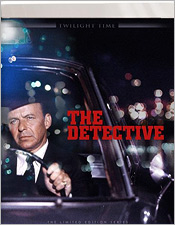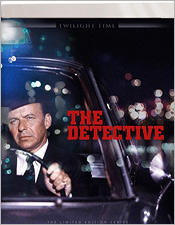Detective, The (Blu-ray Review)

Director
Gordon DouglasRelease Date(s)
1968 (January 19, 2016)Studio(s)
Alcoa Pictures/20th Century Fox (Twilight Time)- Film/Program Grade: A
- Video Grade: A
- Audio Grade: A
- Extras Grade: A
Review
In 1966, novelist Roderick Thorp published his bestselling crime saga The Detective, a doorstop of a book that would become hugely influential in ways both direct and indirect. Before it even hit the bookstores, it was optioned by then novice producer Robert Evans, who planned for it to be his big splash; when Evans was offered a juicy job as an executive at Paramount Pictures, however, he sold his rights in the project to Twentieth-Century Fox, who went on to release it in 1968 as a Frank Sinatra vehicle. Ironically, Sinatra was married to Mia Farrow at the time, and she bailed on her husband when Rosemary’s Baby – one of Evans’s early triumphs at Paramount – ran over schedule and she had to back out of a costarring role in The Detective. Sinatra responded by replacing her with Jacqueline Bisset on screen (and, allegedly, with his other Detective costar Lee Remick in his bed) and serving her with divorce papers. Both The Detective and Rosemary’s Baby went on to be big box office hits, though the former has largely been forgotten while Polanski’s picture became a classic.
Yet in its own way The Detective is just as iconic, and certainly more influential. It serves as a bridge between older cop movies like Detective Story and the more modern style about to explode in the form of films such as Bullitt and Dirty Harry, and establishes many of the conventions that would define crime films for the next several decades. Indirectly, the novel also kick-started the preeminent action style of the late 80s and 90s, since its sequel, Nothing Lasts Forever, would ultimately be adapted (extraordinarily loosely) into Die Hard. There’s little similarity, however, between the tortured, self-reflective detective played by Sinatra in director Gordon Douglas’s 1968 noir and the amiable everyman made famous by Bruce Willis in the unofficial sequel; just as Die Hard is a product of its time, The Detective is a dark, morally complex and challenging work that feels right at home alongside Bonnie and Clyde and The Wild Bunch. If it’s not quite as singular as those two films, it’s still a remarkable piece of classical studio filmmaking merged with the edgier sociopolitical attitudes that were about to obliterate that studio system.
Sinatra plays Joe Leland, a New York City cop who begins the film with a distaste for the corruption of the system he serves and ends it with outright animosity and aggression. His conversion is motivated by a pair of cases he works, one the murder of a prominent homosexual and the other the apparent suicide – but his wife says murder – of a local accountant. The two seemingly unrelated cases start to intertwine, and Leland is forced to take a long hard look not only at his superiors and his peers – and at the dark side of human nature in general – but at himself, and the ways in which he has allowed himself to be compromised by the system. Along the way Leland struggles with his disintegrating marriage and flirts with a new romance, with all of his personal and professional issues coalescing in a moment that foretells the dozens of films and TV shows (most famously, Dirty Harry) in which cops turn their back on the force.
In spite of the clear line from The Detective to Bullitt to Dirty Harry, today The Detective is largely remembered simply for its complete lack of political correctness as far as the presentation of the gay characters goes. Yet even here the movie is better and more complex than its critics give it credit for – much as Dirty Harry was far more subtle and ambivalent than people like Pauline Kael assumed when they dismissed it as right-wing propaganda. To be sure, most of the gay characterizations in The Detective are dated stereotypes, but the fact that Sinatra’s character – our clear identification figure – takes a liberal view toward them and constantly clashes with his homophobic colleagues reveals screenwriter Abby Mann’s true motives. Mann, an old school progressive best known for scripting Judgment at Nuremburg, makes the sly point that in 1968 America, being gay is a crime more punishable by community standards than murder; while the execution is occasionally compromised, it’s also got more nuance than is generally acknowledged.
Twilight Time’s new Blu-ray of The Detective is by far the best presentation I’ve ever seen of the film, a flawless transfer that captures the chiaroscuro subtleties of legendary cinematographer Joseph Biroc with incredible color and contrast. Director Douglas, an underrated studio craftsman, crams every bit of the Cinemascope frame with visual details, and they’re all razor sharp on this edition. The disc features an absolutely fantastic commentary track by film historians David Del Valle, Lem Dobbs, and Nick Redman, who provide an incredibly entertaining and informative guide to the film, its creators, and particularly Sinatra himself. While one can argue with some of their critical assessments (for my money, they grossly underrate Douglas as a director, and, to a certain degree, The Detective itself), their passion and knowledge are irrefutable.
- Jim Hemphill

